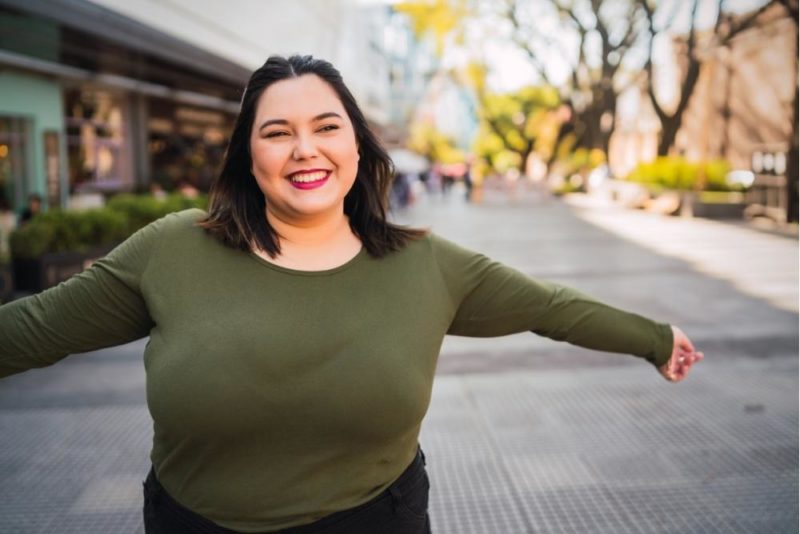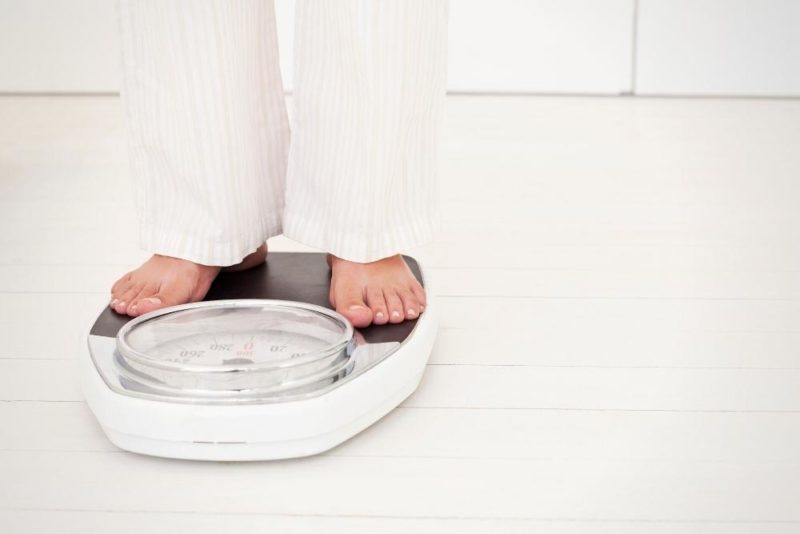Reading Time: 6 minutes
A few weeks ago, a client who is months into her intuitive eating journey had a visit from a long-time friend who credited her recent weight loss to intuitive eating. This whipped up a flurry of thoughts in my client’s head, including “Is she secretly dieting?” and “I’m not losing weight…am I doing intuitive eating wrong?”
If you live in diet culture (and unless you live in seclusion on a mountain top, you do), odds are you have the desire to lose weight, whether it’s “that last five pounds” or 200 pounds. That desire might be casual, or raging and all-consuming. As humans, we want to feel like we fit in, so this desire makes sense.
But you might find yourself at a crossroads when you realize that your past attempts to lose weight have done nothing for you in the long term. In other words, yes, you may have lost weight “successfully” many times, and you may have even maintained one of those losses for quite a while due to constant vigilance. But eventually, what “worked” before stops working, or you strongly suspect that the effort involved in trying to constantly suppress your weight is making you unhappy and getting in the way of more meaningful life pursuits.
You want to have a less fraught and angsty relationship with food and your body, which is right up intuitive eating’s alley. And you naturally think, “Maybe intuitive eating will help me lose weight, as a side benefit.”
Let’s unpack that.

A tale of four editions
First, let me make a bold (and true) statement: intuitive eating is not a weight loss diet, nor was it ever intended to be. Registered dietitians Evelyn Tribole and Elyse Resch, the creators of the Intuitive Eating model (and authors of the book “Intuitive Eating”) developed it because they saw the futility of even the “non-diet” meal plans they crafted for their clients who wanted to lose weight. (As with diets, generally, their clients lost weight only to regain it down the road.)
They developed Intuitive Eating as a way to help people eat nutritiously without dieting. Yet, many people interpreted Intuitive Eating as a sort of non-diet diet. An “intuitive” way to weight loss, if you will. Knowing that, Evelyn and Elyse made modifications with each edition that made their intentions clearer and clearer, I think. That includes the front cover copy, with major changes in bold:
- First and second editions (1996 and 2003) “Intuitive Eating: A Revolutionary Program that Works.” Make peace with food, free yourself from chronic dieting forever. Get to the natural weight that fits you.
- Third edition (2012) “Intuitive Eating: A Revolutionary Program that Works.” Make peace with food, free yourself from chronic dieting forever. Rediscover the pleasures of eating.
- Fourth edition (2020) “Intuitive Eating: A Revolutionary Anti-Diet Approach.” Make peace with food, free yourself from chronic dieting forever. Rediscover the pleasures of eating.
In her November 23, 2020 interview on the “Food Psych” podcast, Evelyn was very open about her (and Elyse’s) evolution over the years. I respect that they continue to learn and grow, as we all are doing, hopefully.

Confusion and co-opting
Like many good things (movement, meal planning, self-care, mindfulness) diet culture and the diet industry have tried to co-opt Intuitive Eating. Let me tell you, when I google “intuitive eating” and see adds for Noom and WW pop up, I see red.
This is frustrating to my intuitive eating clients, too, who initiate a conversation with a friend about what they’re learning, only to have the friend say, “Oh, you mean like Noom?” (Yes, this has really happened more than once!) I receive an email last month from a fitness and calorie-counting app wanting me to write about how they help people eat intuitively. As if!
The bottom line is that any program or plan that promises to change your weight, shape or size is a diet. Full stop. Ditto of the program or plan says you can eat whatever you want, but limits how much you can eat.
In an excellent Mashable article, Resch was quoted as saying:
“Diet culture is getting threatened by intuitive eating. We’re in the beginning of a revolution that has just taken hold. People are sick of dieting, of being told what they should eat, what size their body should be. And the public needs to be educated to pick up on diet culture’s new brainwashing tactics.”

What the book says
No matter who says or implies that intuitive eating helps with weight loss or is a “non-diet” way to lose weight, or helps you lose weight “naturally,” the final word comes from Evelyn and Elyse themselves. In the fourth edition of “Intuitive Eating” (from 2020), they say:
“…any focus on weight loss will sabotage your ability to reconnect with your body’s Intuitive Eating signals. When you focus on weight, it places your attention on external measures for eating—such as the portions of foods, the macros of food—rather than connecting you with your internal cues.”
Page xx
“We understand that you may be feeling uncomfortable in your body and that you believe that weight loss will allow you to have all of the life experiences you may be avoiding. We have tremendous compassion for you as you experience the pressure that diet culture puts on you to meet unrealistic goals of achieving society’s culturally thin ideal. Our goal is to help you find the richest life you can, regardless of your size or shape, and to help you focus on the behaviors that have kept you from feeling the best you can, both physically and emotionally. Remember, focusing on the goal of weight loss will interfere with your ability to make choices based on your body’s signals.”
Page 57
“Taking weight loss out of the picture opens the door to the freedom that can come with respecting your body.”
Page 199
“One of the first questions that we are invariably asked is, Can you help me lose weight? Or how much should I weigh? As we’ve said before, we have compassion for those who hold the hope of weight loss, which is understandable because of diet culture. But our sincere hope is that we can help people shift their focus to enjoying eating and treating their bodies with respect and kindness.”
Page 209

Cognitive dissonance
But if you’re listening to your body about what and when to eat, you’ll surely lose weight, right? Our bodies want to be thin, right?
The reality is that each of us has a different genetic blueprint for size and shape, and part of becoming an intuitive eater and having a more peaceful, nourishing and uncomplicated relationship with food is accepting our individual blueprint. And that blueprint might not be what we wish it was, especially if the weight range your body wants to settle at is high enough that you experience weight stigma. (For a nice illustration of the genetic blueprint idea, I recommend watching the video “Poodle Science.”)
Clinging to the idea that your set point range is surely on the thinner side isn’t much different than hoping that intuitive eating will help you lose weight without actually dieting.
Some of my intuitive eating clients lose weight, some gain weight, some hover at about the same weight they were at when they said “yes” to intuitive eating and “no” to yet another diet. Sometimes there’s some temporary fluctuation as someone settles in to intuitive eating.
When someone wants me to predict what their weight will do, I can’t. It depends on so many variables, including your genetic blueprint, as mentioned, as well as where you are in your cycle of weight gain and loss that goes along with repeat dieting.
That said, I don’t judge anyone for hoping that intuitive eating will lead to weight loss. Again, we all live in diet culture, and we’ve been collectively (falsely) programmed to believe we need to pursue at least relative thinness in order to be attractive, healthy and happy. The desire for weight loss can’t be turned off like a faucet, but it can be placed on the back burner. It’s there, we know it’s there, but we’re not fixated on it.
You can read more about intuitive eating and weight loss in a post I wrote last year.
This post contains Amazon Affiliate links. As an Amazon Associate I earn from qualifying purchases.
Carrie Dennett is a Pacific Northwest-based registered dietitian nutritionist, freelance writer, intuitive eating counselor, author, and speaker. Her superpowers include busting nutrition myths and empowering women to feel better in their bodies and make food choices that support pleasure, nutrition and health.
 Print This PostOriginal Article
Print This PostOriginal Article










